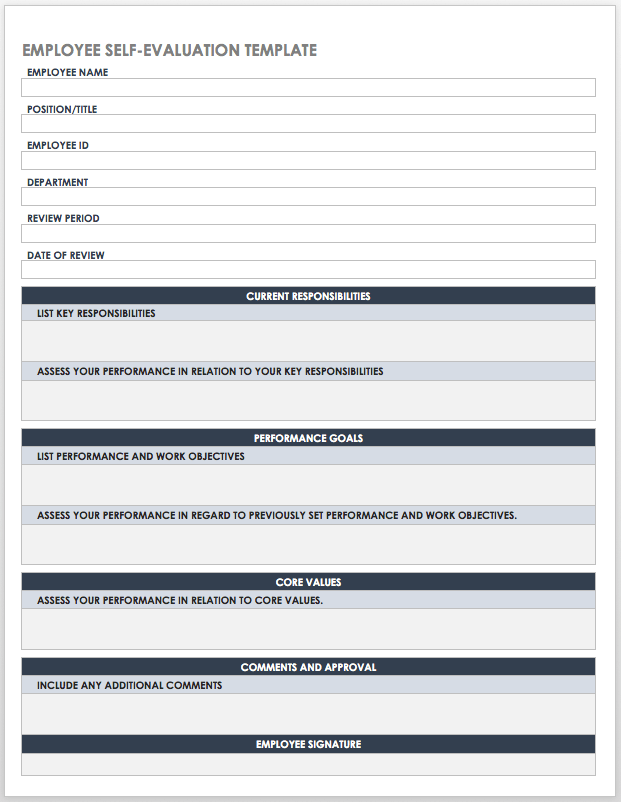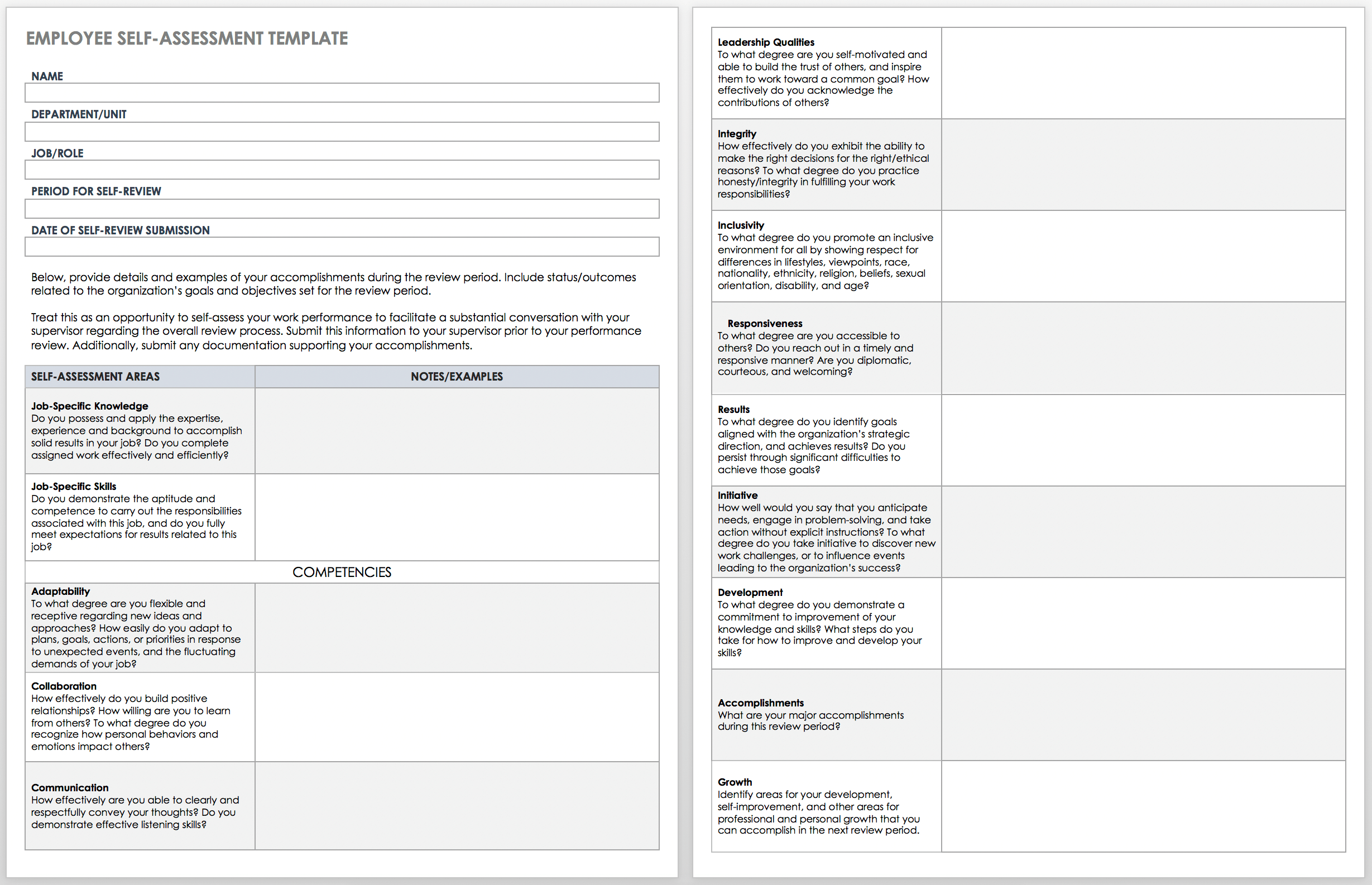Have you ever wondered how you can truly measure your growth and progress at work? Self-performance evaluation might just be the key to unlocking your full potential.
Imagine having the power to identify your strengths and areas for improvement, giving you a roadmap to success. It’s not just about ticking boxes on a form; it’s about taking control of your own professional journey. By engaging in self-evaluation, you can gain valuable insights into your work habits and productivity.
This process empowers you to make informed decisions about your career path. Curious to learn how to evaluate your performance effectively and boost your career prospects? Keep reading to discover practical tips and strategies that can transform your professional life.
Table of Contents
ToggleImportance of Self-performance Evaluation
Self-performance evaluation plays a crucial role in personal growth. It provides a clear picture of strengths and weaknesses. Knowing where you stand helps in setting goals. It boosts confidence and enhances productivity. Regular evaluation keeps you on track. It ensures continuous improvement.
Understanding Personal Strengths and Weaknesses
Evaluation helps in identifying personal strengths. Recognizing strengths boosts self-esteem. It encourages you to utilize them effectively. Weaknesses are equally important to acknowledge. They offer areas for improvement. Understanding these aspects leads to better performance.
Setting Realistic Goals
Goals should be realistic and achievable. Self-evaluation aids in goal-setting. It helps in identifying what is possible. You can set targets based on past performance. This makes goals more attainable. Achieving goals improves motivation.
Enhancing Self-motivation
Evaluating your performance boosts motivation. Knowing your progress fuels the drive to improve. It encourages taking initiative and striving for excellence. Self-motivation leads to better results. It fosters a positive mindset towards challenges.
Improving Decision-making Skills
Good decision-making stems from self-awareness. Evaluation enhances this skill. It provides insights into past choices. You learn from previous mistakes. This leads to better decisions. Improved decision-making benefits all areas of life.
Tracking Progress and Achievements
Tracking progress shows how far you’ve come. It highlights achievements and milestones. This boosts morale and encourages further effort. Regular tracking ensures consistent improvement. It helps in celebrating small victories.
Building Confidence
Confidence grows with self-awareness. Evaluation strengthens this trait. It reassures you of your capabilities. Knowing your potential builds self-assurance. Confident individuals face challenges head-on. They are prepared for unexpected situations.
Setting Clear Goals
Setting clear goals is a crucial part of self-performance evaluation. Goals provide direction and purpose. They help in tracking progress and measuring success. Without clear goals, evaluating performance becomes challenging. Goals should be specific, measurable, achievable, relevant, and time-bound (SMART). This structure ensures clarity and focus.
Aligning with Organizational Objectives
Aligning personal goals with organizational objectives is essential. It ensures consistency in efforts. This alignment benefits both the individual and the organization. Employees contribute effectively towards the company’s mission. Understanding organizational goals is the first step. It aids in setting relevant personal goals. This creates a sense of purpose and direction.
Personal Development Targets
Personal development targets focus on individual growth. They enhance skills and competencies. These targets should be realistic and achievable. Setting personal goals boosts motivation and confidence. It encourages continuous learning and improvement. Reflecting on past performance is helpful. It identifies areas needing development.
Identifying Strengths and Weaknesses
Self-performance evaluation is essential in personal and professional growth. It involves identifying strengths and weaknesses. This process helps individuals understand their capabilities. It also highlights areas needing improvement. Recognizing strengths boosts confidence. Addressing weaknesses fosters development. This journey is insightful and constructive.
Recognizing Core Competencies
Core competencies are the skills you excel in. They define your professional identity. Self-awareness in these areas is vital. It enables you to leverage them effectively. Identify tasks you perform with ease. Reflect on feedback from peers and supervisors. Note where you consistently achieve positive outcomes. These are your core competencies.
Addressing Areas for Improvement
Weaknesses can hinder progress. Identifying them is the first step to growth. Analyze situations where you struggle. Consider feedback highlighting areas needing attention. Set realistic goals to address these weaknesses. Develop a plan to enhance your skills. Continuous learning and practice are key. Progress may be slow, but it’s valuable.

Credit: www.smartsheet.com
Gathering Feedback
Gathering feedback is vital for a successful self-performance evaluation. Feedback from colleagues and managers helps identify strengths and weaknesses. It provides a comprehensive view of your performance. This insight is crucial for personal growth and development. Use it wisely to enhance your skills and career trajectory.
Soliciting Peer Reviews
Peer reviews offer valuable perspectives on your work. Colleagues see your day-to-day actions and interactions. They understand your working style and contributions. Request feedback from peers you trust. Choose those who can offer constructive criticism. This feedback can reveal blind spots in your performance. Address these areas to improve and grow.
Utilizing Manager Insights
Managers have a broad view of your performance. They see how you fit into the team and the company goals. Their feedback is essential for a balanced evaluation. Schedule a meeting to discuss your progress. Ask specific questions about your strengths and areas for improvement. This helps in understanding your performance from a leadership perspective. Use this insight to align your goals with company objectives.
Analyzing Performance Metrics
Analyzing performance metrics is crucial in self-performance evaluations. It gives insights into strengths and areas for improvement. Through these metrics, individuals can understand how to better their skills and productivity. This approach combines quantitative data and qualitative feedback. Together, they provide a comprehensive view of performance.
Quantitative Data Assessment
Quantitative data offers measurable insights. It includes numbers and statistics related to performance. Look at sales figures, project completion rates, and task efficiency. These metrics paint a clear picture of achievements. They show how well someone meets set goals. Tracking these numbers over time reveals trends. It highlights growth or areas that need focus. Regular assessments help in setting realistic targets. They also guide in making informed decisions for future actions.
Qualitative Feedback Analysis
Qualitative feedback provides valuable insights beyond numbers. It includes comments and observations from peers and supervisors. This feedback highlights behavioral aspects of performance. It can reveal teamwork skills, communication abilities, and problem-solving capabilities. Listening to this feedback helps in understanding the impact of actions. It offers a chance to learn and grow personally and professionally. Analyzing this feedback fosters self-awareness. It encourages a deeper understanding of one’s role and contributions.

Credit: www.smartsheet.com
Developing an Action Plan
Developing an action plan for self-performance evaluation is crucial. It helps turn insights into tangible progress. After identifying strengths and weaknesses, the next step involves setting clear goals. This structured approach ensures continuous growth and improvement.
Setting Achievable Milestones
Start by breaking down larger goals into smaller, manageable tasks. This makes the process less overwhelming. Each milestone acts as a stepping stone towards the final objective. Celebrate small victories to stay motivated. Set realistic timelines for each task to maintain steady progress.
Implementing Improvement Strategies
Identify specific strategies to enhance performance. Focus on areas needing improvement. Use feedback from evaluations to guide these strategies. Seek resources like books, courses, or workshops. These can provide valuable insights and skills. Regularly review your strategies to assess their effectiveness.
Tracking Progress
Evaluating your own performance helps you track progress effectively. It allows you to identify strengths and areas for improvement. Regular self-assessment can boost confidence and focus on personal development.
Tracking your progress during a self-performance evaluation can be a game-changer. It helps you see where you excel and where you might need a bit more effort. Knowing your progress keeps you motivated and focused. When you track your progress, it’s like having a map to guide your journey. It shows you the milestones you’ve reached and those still ahead. This awareness is crucial for personal growth and achieving your goals.
Regular Check-ins
Regular check-ins are essential for tracking progress. They allow you to reflect on your achievements and identify areas for improvement. Set a specific time each week to review your progress. During these check-ins, ask yourself: What went well this week? What challenges did I face? How can I address these challenges moving forward? These questions help you stay on track and make necessary adjustments. Keeping a journal or digital log can be helpful. Record your successes and setbacks. Over time, you’ll notice patterns and trends that can inform your future actions.
Adjusting Goals as Needed
Life is unpredictable, and sometimes goals need to change. Adjusting goals is not a sign of failure but a response to new information or circumstances. Be flexible and open to change. If you notice that a goal is no longer relevant or achievable, modify it. This could mean changing the timeline, altering the goal slightly, or even setting a new goal altogether. The key is to remain adaptable. Consider: Are your goals still aligned with your values and priorities? If not, it’s time to reassess and adjust. This ensures that your efforts are meaningful and directed towards what truly matters to you. Tracking progress is not just about ticking boxes. It’s about understanding yourself better and making informed decisions. Stay curious, stay committed, and watch yourself grow.
Reflecting on Achievements
Reflecting on achievements is a vital part of self-performance evaluation. It helps identify progress and areas for improvement. By looking back, one can understand personal growth. This process boosts confidence and sets a path for future goals. It provides insights into strengths and weaknesses. Through reflection, individuals can celebrate their successes and learn from their setbacks.
Celebrating Successes
Celebrating achievements boosts motivation and self-esteem. Recognize big and small wins. Each success is a step forward. It builds a positive mindset. Share achievements with peers or mentors. This creates a supportive environment. Celebrations mark milestones in personal and professional growth. They remind us of our capabilities. Acknowledging success encourages us to aim higher.
Learning from Setbacks
Setbacks are part of the journey. They offer valuable lessons. Analyzing setbacks leads to better strategies. It improves problem-solving skills. Reflect on what went wrong. Identify areas needing improvement. Use setbacks as learning opportunities. They teach resilience and adaptability. Embrace setbacks as a chance for growth. They prepare us for future challenges.
Enhancing Career Growth
Enhancing career growth requires intentional self-reflection and assessment. Self-performance evaluations play a vital role in this process. Through these evaluations, individuals can identify their strengths, recognize areas for improvement, and set realistic goals. Self-awareness gained through evaluations can be a powerful tool for career advancement.
Leveraging Strengths
Understanding personal strengths can boost confidence and productivity. Knowing your strengths allows you to focus on tasks that align with your abilities. This alignment leads to better job satisfaction and efficiency. Highlight your strengths in performance reviews to gain recognition. Demonstrating your unique skills can open doors to new opportunities.
Preparing for Future Opportunities
Self-evaluation helps in setting career goals. It prepares you for future opportunities by identifying skill gaps. By addressing these gaps, you become a more attractive candidate for promotions. Regular self-assessment keeps you aware of industry trends and needed skills. Stay proactive in your career journey. Be ready for opportunities that come your way.

Credit: www.indeed.com
Frequently Asked Questions
What Is an Example of a Good Self-evaluation for Performance Review?
A good self-evaluation highlights achievements, sets goals, and identifies areas for improvement. Mention specific accomplishments, skills enhanced, and successful projects. Reflect on challenges faced and lessons learned. Set clear objectives for the future and express commitment to personal growth. Keep the tone positive and constructive.
How Do I Write My Self-performance Evaluation?
Start by listing your achievements and specific contributions. Use measurable results to highlight your impact. Be honest about areas for improvement. Align your evaluation with company goals. Keep the tone positive and professional.
What Is an Example of Evaluating Your Own Performance?
An example of evaluating your own performance is setting personal goals and measuring progress against them regularly. Reflect on achievements, areas for improvement, and seek feedback from peers or mentors. This helps identify strengths and weaknesses, promoting professional growth.
How Do I Evaluate My Own Performance?
Set clear goals and track your progress regularly. Seek feedback from peers and supervisors. Reflect on your achievements and areas for improvement. Use self-assessment tools and performance metrics. Adjust strategies based on evaluation results.
Conclusion
Evaluating your performance is key. It shows growth and improvement. Small steps matter. Each evaluation reveals new insights. You learn about your strengths. You find areas to improve. This process builds confidence. It guides future goals. Reflect often. Adjust your strategies.
Celebrate your achievements. Self-evaluation boosts your career. It helps you succeed. Keep track of your progress. Be honest and open. Regular evaluation is a powerful tool. Use it wisely. Aim for continuous development. Your future depends on it. Stay committed.
Always strive for better results. The journey is rewarding.




